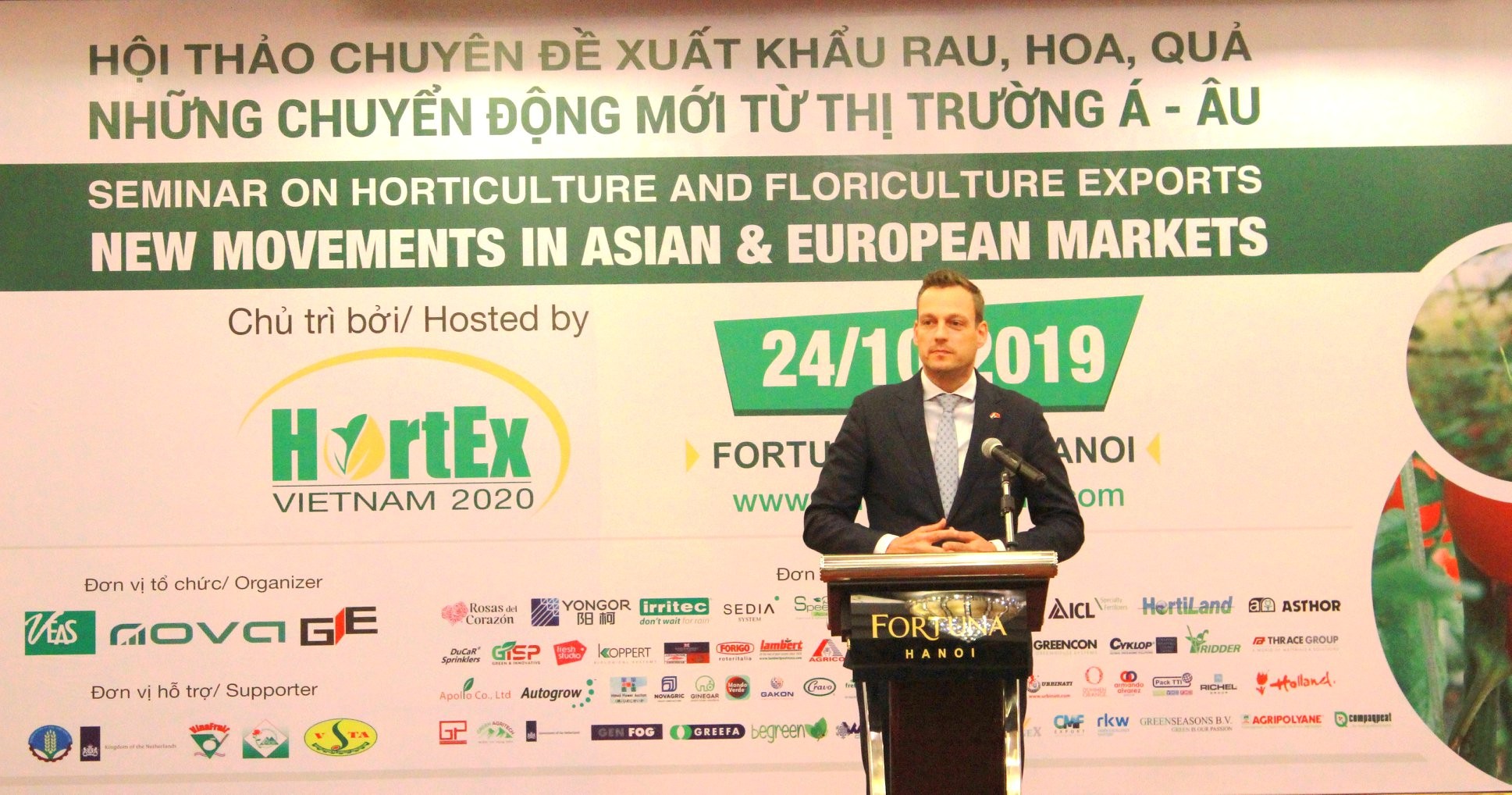- Giới thiệu
- Nhóm Công tác
- Tin tức
- Thông tin về FTA
- Tài Liệu
- Sự kiện
- Liên hệ
Prospect for fruits and vegetables export to Asia - Europe markets
A series of events on Horticulture and Floriculture Exports - New movements in Asian and European markets hosted by HortEx Vietnam 2020 took place from October 22 - 24, 2019 in Ho Chi Minh City, Da Lat City and Hanoi Capital.

Photo: Mr. Willem Schoustra – Dutch Agriculture Counselor to Vietnam and Thailand speaking at the Seminar (Source: HortEx)
The series of events attracted the participation of representatives from the Ministry of Industry and Trade, the Ministry of Agriculture and Rural Development of Vietnam, the Vietnam Fruit and Vegetable Association, the Dalat Flower Association, the Dutch Embassy to Vietnam, together with media agencies and organizations and enterprises in flowers, vegetables and fruits sector.
Vietnam's fruit and vegetable industry has seen remarkable growth in recent years, especially in exports. Specifically, fruit and vegetable exports in 2018 set a record with a growth rate of 10.8%, exceeding the country's crude oil export turnover, according to the General Department of Vietnam Customs. According to the Agro Processing and Market Development Authority, in the first 6 months of 2019, the export value of vegetables and fruits reached US$ 2.06 billion, up 3.9% compared to the previous year and is expected to continue to grow. Despite their recent booming in the last 10 years, horticulture and floriculture have shown great potential and promise to make Vietnam one of the largest fruit exporters in the world.
Asia and Europe are important markets for Vietnam's fruit and vegetable import and export, with up to 8 countries and territories in the TOP TEN fruit and vegetable export markets and 6 countries and territories in the TOP TEN fruit and vegetable import markets of Vietnam. Recently, the Vietnam - EU Free Trade Agreement (EVFTA) and the Investment Protection Agreement (IPA) between the European Union (EU) and Vietnam were signed in Hanoi. These agreements are expected to create favorable conditions for businesses to expand export markets, participate in the value chain as well as global production networks.
In addition to these advantages, Vietnam’s enterprises also have to face with challenges requiring them to improve production, product quality, apply high technology in production, processing, preservation and packaging, shipping to efficiently engage in the global supply chain, meeting the increasingly stringent requirements of export markets as well as competition in the domestic market.
In this context, a series of events on Horticulture and Floriculture Exports themed “New movements in Asian and European markets” were held from October 22 - 24, 2019 in Ho Chi Minh City, Da Lat City and Hanoi Capital to create a platform for industry players to discuss and exchange pressing issues of the sector on different topics including: the main export markets of Vietnam’s Horticulture and Floriculture products; EVFTA - a view from the fruit and vegetable production and trading industry; a seminar on opportunities and challenges for fruit and vegetable production and trading enterprises exporting to Asian and European markets.
Dr. Le Thanh Hoa - Deputy Director General of the Agro Processing and Market Development Authority, said that besides the advantages, EVFTA and IPA pose urgent requirements for businesses to improve their products, upgrate product quality, adopt advanced technology in production, processing, storage, packaging, transportation to join global supply chains, meeting the increasingly stringent requirements of different export markets as well as efficiently remain competitive in the domestic market. Enterprises must step by step equip themselves with knowledge and techniques to meet the needs of the market.
Sharing experiences from the Netherlands, Mr. Willem Schoustra said that the Netherlands is a country famous for its strong agricultural development. However, its success did not come overnight. Agricultural products of the Netherlands exported to the world are not only high in quality but also sustainable. Mr. Willem emphasized the need for investment in new technology and modern equipment, which is extremely important in cooperating and connecting with partners in the development of value and supply chain.
Tin liên quan
Building digital data for rice production management2024/04/22
VIETRISA is responsible for certifying the National rice brand2024/04/08
1 million hectares of high-quality rice project: Large fiscal space for businesses2024/04/03
Research and selection of climate resilient crop varieties2024/03/23
Over 29,000 hectares of rice in the Mekong Delta are at risk of saline intrusion2024/03/11



 Điều lệ hoạt động
Điều lệ hoạt động



















































